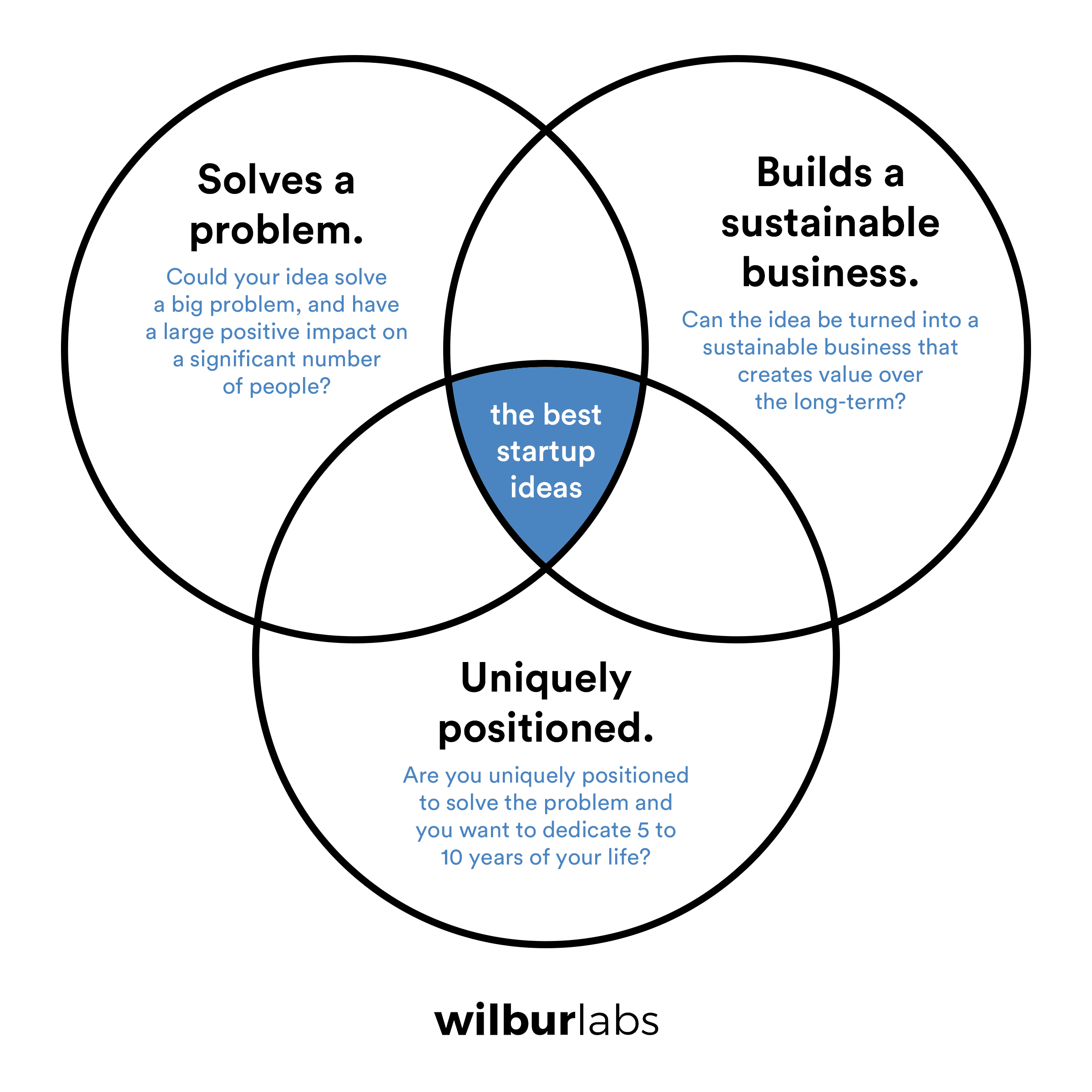Watch this YouTube video on how to get startup ideas in our Founder FAQ series.
Startups and technology can’t solve all the world’s problems, but they can solve a good amount of them. Now more than ever, we need people to build the next generation of companies that will tackle some of the world’s biggest problems. There are a lot of unknowns right now, but at Wilbur Labs, we believe this is the best time to start a company — ever.
Wilbur Labs is a startup studio turning bold ideas into market-leading companies. Since 2016, we have built and invested in 21+ companies, including VacationRenter, Joblist, Barkbus, OpenMedicare, FinanceHQ, and more.
We launch several companies per year, which requires building a solid pipeline of ambitious ideas. Over the years, we have used three primary approaches to get startup ideas: build for the future, solve existing problems better, or solve personal problems.
1. Build for the Future
The future is not static. It is built by people who have a vision for what the future should look like, and those who have the willingness to work hard and take the risks necessary to get there. A great way to get startup ideas is to sit down and think about what the future should look like. Ask yourself the following questions:
How are behaviors changing? Which changes will stick?
What long-term problems are created as a result of your current environment?
What priorities and values have changed?
What are the biggest problems today?
What will be the biggest problems tomorrow?
What new problems can technology solve today?
How can new technology change the way existing problems are solved?
2020 was a year when consumer behaviors changed and evolved at a faster rate than ever before. Since then, emerging trends that would have taken 5 to 10 years to mature are instead maturing overnight. There is ample opportunity to think about changing trends and build companies ahead of the curve. Ecommerce, Employment, Insurance, and Mobile On-Demand are just a few industries where we are boosting investments as a result of new long-term trends.
When thinking about the future, it’s important to think and plan for the long-term. The best ideas can be built into big, sustainable businesses that can solve problems and create value over the long-term. Avoid short-termism, also known as ideas which may seem solid in the short-term but have a short expiration date.
Barkbus is a great example of a business that is building for the future. Back in 2017, the world was rapidly transitioning to direct-to-your-door services. Despite that, the way most people got their dogs groomed hadn’t changed. Pet parents still went to the salon, which was a time consuming and stressful experience for both dogs and their parents. Barkbus launched to make mobile grooming the new norm for pet parents and their dogs.
2. Solve Existing Problems Better
We believe the best companies solve real problems. These problems may be completely new problems, or they may be existing problems that have not been solved well by existing companies to date.
Do not discount existing problems when generating startup ideas. Some of the largest, most impactful companies throughout history were built by solving existing problems better than others. Google did not invent the search engine, search ads, web-based email, or maps. Apple did not invent the smartphone, the tablet, or the smartwatch. Facebook did not invent social networking. The list goes on and on. What these companies did is provide a better experience than the existing companies. At Wilbur Labs, we refer to this as “creating a 10x experience.”
Next time you have an idea and someone says, “Doesn’t X do that?” — instead of throwing away your idea, first decide if there’s an opportunity to 10x the experience. Competitors are a good sign as it means there is a real problem people care about. Challenging the status quo is a great way to solve big problems and build a large business.
When we built Joblist, we did so because, despite multiple large job boards, the job search process hadn’t changed in 20 years — when job listings first moved online. We saw an opportunity to 10x the job search experience by introducing more personalization and collaboration tools to a traditionally generic and lonely process. Job seekers have embraced this new approach, which allowed Joblist to help millions of job seekers by powering over 500,000 new applications before their public launch.
3. Solve Personal Problems
Many of the best startup ideas are personal problems that you have faced. What are the biggest problems that you wish were solved? How many others face the same problem? If you experience a problem, then you are uniquely positioned to solve it.
More often than not, entrepreneurship is not a way to get rich quickly. You will likely need to work harder and longer, with higher stress and more at stake than working a regular job. The journey is absolutely worth it for the right person, but it’s important that you care enough about what you are working on enough to dedicate 5 to 10 years of your life. This will be easier if you care deeply about the problem you are solving.
A great example of this is why we launched VacationRenter. At Wilbur Labs, we had quarterly company offsites where we book a vacation rental to work for a few days in a different city. Every time we searched for a rental, it took hours of planning and work. We found ourselves scrolling through pages of search results and jumping from site to site, trying to find the ideal place for the best price. This was a frustrating experience and we knew we could make the search for a vacation rental better for others like us — which is why we launched VacationRenter. If you experience a problem, it is likely that others are experiencing it too.
VacationRenter became the fastest-growing travel startup ever, generating over $1 billion gross bookings in 2020. This milestone confirms that we weren’t the only travelers who had a frustrating experience finding the perfect rental.
Next Steps
At Wilbur Labs, the best startup ideas check a few key boxes:
- Solves a problem. Could your idea solve a big problem and have a large positive impact on a significant number of people?
- Builds a sustainable business. Can the idea be turned into a sustainable business that creates value over the long-term?
- Uniquely positioned. Are you uniquely positioned to solve the problem and you want to dedicate 5 to 10 years of your life?

No matter how good an idea is, we believe that ideas alone are worthless unless you take initiative to execute. Execution is everything. Everyone has big ideas — no startup ideas are truly unique. Being able to execute on those ideas is what will turn that idea into a business.
For any idea, the most important next step is thorough research where you pair your initial idea with independent and external information. To read more about how to evaluate and research a startup idea, and how to take the next step, follow our blueprint on How to Turn An Idea Into A Business.
Make sure to follow Wilbur Labs on LinkedIn, Twitter, Facebook, or Instagram as we continue to release more blueprints in the future.
Want to work with us or have an idea? We are always looking for talented people to work with and exciting projects to partner on. Feel free to check out our available openings or contact us.
Wilbur Labs is a startup studio. We turn bold ideas into market-leading companies.
Learn More →